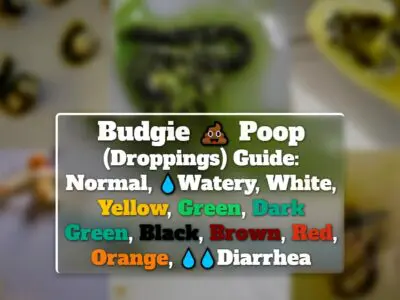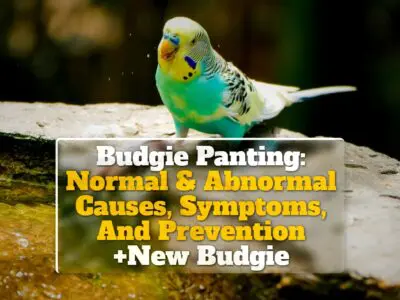Budgies with diarrhea present symptoms like watery or excessively runny droppings, lethargy, and decreased appetite.
Causes range from diet, infections, to environmental stressors and exposure to toxins.
Treatment includes veterinary care, diet modification, and clean surroundings, with prevention focusing on regular veterinary check-ups and maintaining a balanced diet and clean environment.
Normal budgie droppings are relatively solid, while watery droppings could be a sign of diarrhea.
I am a former budgerigar owner and I have encountered many times when my budgies have diarrhea.
It’s a common symptom that can signify several underlying health issues.
In this article, I will talk about the symptoms, causes, types of diarrhea in budgies, and how to treat and prevent it.
What Is Diarrhea In Budgies?
Diarrhea in budgies refers to a common health problem characterized by frequent, loose, and watery droppings.
Budgies, also known as budgerigars or parakeets, have a specific pattern of bowel movements.
However, various factors can cause this pattern to alter, leading to what can be identified as diarrhea.
These factors could be as simple as a change in diet or as serious as a bacterial, viral, or fungal infection.
In some cases, the bird’s digestive system might be trying to expel toxins or poisons.
A prolonged case of diarrhea can lead to dehydration and serious health complications, requiring immediate veterinary attention.
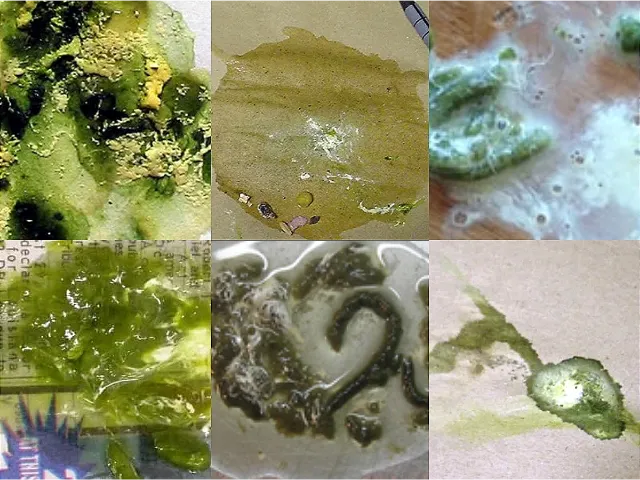
How Do I Know If My Budgie Has Diarrhea?
Identifying diarrhea in budgies involves keen observation of their droppings and their behavior.
Budgie droppings consist of two parts – the feces (which should be firm and coiled) and the urine (a white, pasty substance).
Diarrhea manifests itself as loose, unformed feces, and an increase in the amount of urine.
In terms of behavior, a budgie with diarrhea may show signs of lethargy, loss of appetite, weight loss, or exhibit a fluffed-up appearance.
Also, look for a dirty vent area (the place where droppings exit) which is a clear sign of diarrhea.
If your budgie exhibits these signs and symptoms, it is advisable to consult with a vet immediately.
What Is Polyuria In Budgies?
Polyuria refers to an increase in the volume of urine in the bird’s droppings.
This condition is often confused with diarrhea due to the increased water content in the droppings.
However, in polyuria, the feces part of the droppings remains normal – firm and coiled – while the urine part appears increased and watery.
Causes of polyuria can be varied, from dietary causes (like a diet high in fruits and vegetables) to more serious conditions such as kidney disease, diabetes, or liver disease.
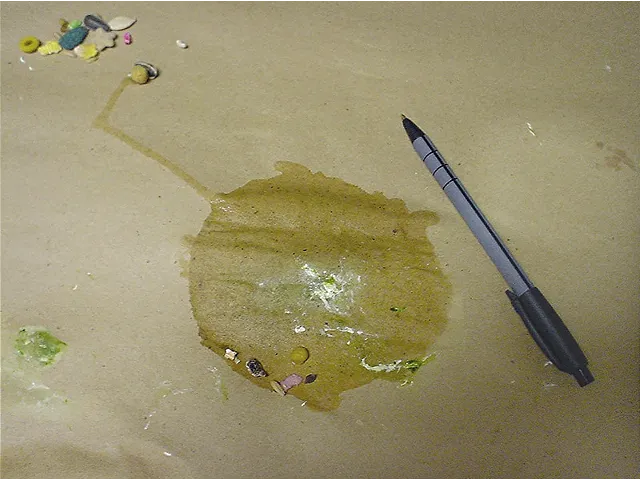
What Is Watery Poop In Budgies?
Watery poop in budgies, often confused with diarrhea, is characterized by an increased water content in the droppings making them appear loose and watery.
This can happen due to dietary changes, increased fluid intake, or could be a sign of disease.
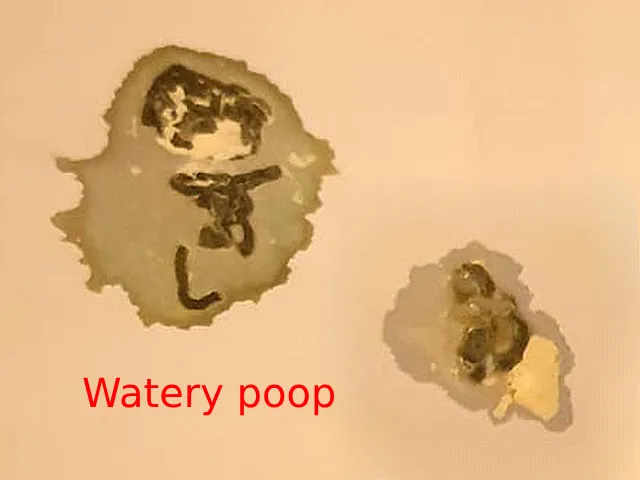
It’s important to understand that watery poop and diarrhea are not the same.
Watery poop still maintains the distinction between feces and urine, whereas in diarrhea, the feces part is also unformed and watery.
Here is a table that shows some healthy foods for budgies, and they can make your budgie’s poop watery.
| Food Item | Explanation |
|---|---|
| Fresh fruits | Many fruits are high in water content, and while they’re healthy, too much can lead to watery droppings. Examples include watermelon, oranges, and grapes. |
| Leafy green vegetables | Similar to fresh fruits, leafy green vegetables such as spinach and lettuce are full of nutrients but also have high water content, which may cause watery droppings if consumed in large quantities. |
| Tomatoes | Tomatoes are healthy for budgies but they are also high in water content, so excessive consumption can lead to watery poop. |
| Cucumber | Cucumbers are mainly water, and while they can be a refreshing treat for budgies, too much can cause watery droppings. |
| Berries | Berries like strawberries and blueberries are excellent sources of antioxidants but have a high water content, which could result in watery droppings if the bird overindulges. |
Does Every Watery Poop Mean Diarrhea In Budgies?
Not every watery poop necessarily means diarrhea in budgies.
Watery poop could be the result of a diet rich in water content like fruits and vegetables, or simply due to increased drinking.
A one-off occurrence of watery poop may not be cause for concern, but if it persists, it might indicate a health issue, including but not limited to diarrhea.
Therefore, consistent observation and monitoring of your budgie’s droppings is vital to identify potential health problems early.
Normal Vs Watery Poop
Normal budgie poop consists of dark, coiled feces and a white, pasty urine part.
The feces should be firm and retain its shape.
On the other hand, watery poop in budgies tends to be uncoiled with a lot more water, giving it a loose and watery appearance.
However, even in watery poop, the two parts – feces and urine – can still be distinct.
If both parts become unformed and watery, this may indicate diarrhea.
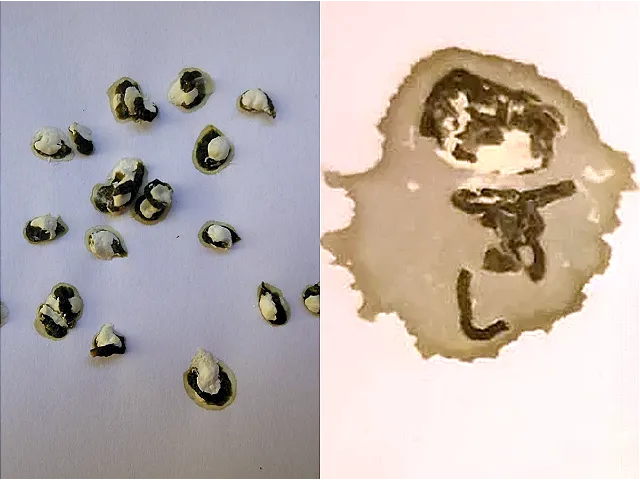
What Are The Common Causes Of Diarrhea In Budgies?
Diarrhea in budgies can be caused by a variety of factors ranging from dietary issues to infections, stress, and exposure to toxic substances.
Understanding these causes can help in early detection and appropriate treatment of the condition.
Here are some of the common causes:
Dietary Issues
Dietary changes or imbalances, toxic foods can lead to diarrhea in budgies.
A diet high in fruits and vegetables, for instance, can cause loose droppings due to the high water content.
Furthermore, feeding your budgie a diet lacking in essential nutrients or too much of a certain type of food can also lead to digestive issues, including diarrhea.
| Food Item | Explanation |
|---|---|
| Overly ripe fruits | Fruits that are overly ripe may harbor bacteria or yeast which can upset a budgie’s digestive system and cause watery poop or diarrhea. |
| Too much fresh fruit | While fresh fruits are a good source of nutrition for budgies, they are high in water content. Too much of these can lead to watery droppings. |
| Avocado | Avocado is toxic to birds, including budgies. Consumption can lead to diarrhea, among other more serious symptoms. |
| Dairy products | Budgies are lactose intolerant. Any form of dairy can upset their digestive system, causing diarrhea. |
| Chocolate | Chocolate contains theobromine, which is toxic to birds. This can cause a variety of symptoms, including diarrhea. |
| Alcohol | Budgies should never consume alcohol as it’s harmful to them and can cause diarrhea, among other health issues. |
| Caffeine | Foods and drinks containing caffeine can lead to digestive upset in budgies, including diarrhea. |
| Onions and Garlic | These can cause digestive problems in budgies, including diarrhea, due to their high sulfur content. |
| Spoiled or contaminated food | Food that is spoiled or contaminated with bacteria, mold, or other harmful substances can cause severe digestive upset in budgies, including diarrhea. |
Bacterial Infections
Budgies are prone to various types of bacterial infections, some of which can cause diarrhea.
The common culprits include Campylobacter, Salmonella, and E.coli, among others.
These bacteria can disrupt the normal functioning of the bird’s digestive system, leading to loose, watery droppings.
Viral Infections
Certain viral infections, such as Avian Gastric Yeast (formerly known as Megabacteria) or Psittacine Beak and Feather Disease (PBFD), can also cause diarrhea in budgies.
These viruses affect the bird’s digestive system, leading to symptoms including diarrhea.
Parasitic Infections
Parasites, such as worms and coccidia, can infest a budgie’s digestive system and lead to diarrhea.
These parasites damage the digestive tract, leading to symptoms such as diarrhea, weight loss, and overall ill health.
Stress And Environmental Factors
Stress is a common cause of diarrhea in budgies.
This can be due to sudden changes in their environment, lack of social interaction, or a change in their routine.
Furthermore, environmental factors such as poor hygiene, overcrowding, or exposure to fluctuating temperatures can also lead to diarrhea.
Antibiotic Use
The use of antibiotics can disrupt a budgie’s gut flora, leading to diarrhea.
While antibiotics are crucial in treating bacterial infections, their misuse or overuse can lead to an imbalance in the gut bacteria, causing digestive problems including diarrhea.
Intestinal Disorders
Intestinal disorders, such as inflammatory bowel disease (IBD) or tumors in the digestive tract, can lead to diarrhea in budgies.
These disorders can disrupt the normal functioning of the bird’s digestive system, leading to various symptoms including diarrhea.
Toxic Substances
Exposure to toxic substances can cause diarrhea in budgies.
This includes toxic plants, certain human foods, heavy metals (like lead or zinc), and certain household cleaners.
Ingestion or inhalation of these substances can lead to a range of symptoms, with diarrhea being one of them.

What Are The Types Of Diarrhea In Budgies?
In budgies, diarrhea can take several forms depending on the underlying cause.
Here are the common types:
Causes Directly Affecting The Digestive System
This category includes causes that directly influence the bird’s digestive system, causing inflammation, abnormalities, or damage that leads to diarrhea.
Here are some of these causes:
Enteritis And Its Causes
Enteritis, or inflammation of the intestine, is a common cause of diarrhea in budgies.
This condition can be caused by bacterial, viral, or parasitic infections, dietary imbalances, or exposure to toxic substances.
Enteritis disrupts the normal absorption and digestion of nutrients, leading to loose, watery droppings.
Megabacteriosis
Megabacteriosis is a type of fungal infection that affects the digestive system of budgies, causing symptoms like weight loss, regurgitation, and diarrhea.
This infection, caused by Avian Gastric Yeast (formerly known as Megabacteria), can result in severe digestive problems if left untreated.
Gizzard Abnormalities
Gizzard abnormalities, such as gizzard erosion or gizzard impaction, can lead to diarrhea in budgies.
The gizzard is a part of a bird’s stomach that grinds food.
If it’s not working properly due to disease or a blockage, it can cause digestive issues including diarrhea.
Villous Atrophy And Fusion
Villous atrophy and fusion is a condition where the villi (small, finger-like projections in the intestine that absorb nutrients) shrink or fuse together.
This can greatly reduce the surface area for nutrient absorption, leading to malnutrition and diarrhea in budgies.
Worm Infections
Worm infections can cause diarrhea in budgies.
Common worms that infest budgies include roundworms, tapeworms, and hairworms.
These parasites can cause damage to the digestive tract, leading to diarrhea and other symptoms.
Bowel Infarction
Bowel infarction refers to tissue death in the intestine due to a lack of blood supply.
This is a serious condition that can cause severe diarrhea, among other symptoms.
It requires immediate veterinary attention.
Causes Primarily Affecting Other Organs But Producing Diarrhoea As A Secondary Effect
While many causes of diarrhea in budgies relate directly to the digestive system, there are other conditions affecting various organs that can also lead to diarrhea.
These causes may seem unrelated to the digestive system, but their effects can cause diarrheal symptoms as a secondary response.
Kidney Malfunction
Kidney malfunction can lead to diarrhea in budgies.
The kidneys help to regulate the amount of water in the body and remove waste products from the bloodstream.
If the kidneys aren’t functioning properly, it can cause an imbalance in the water content of the droppings, leading to a diarrhea-like condition.
Inflamed Liver
An inflamed liver, or hepatitis, can also cause diarrhea in budgies.
The liver plays an important role in digestion by producing bile, which helps break down fats.
If the liver is inflamed, it can disrupt this process and result in symptoms including diarrhea.
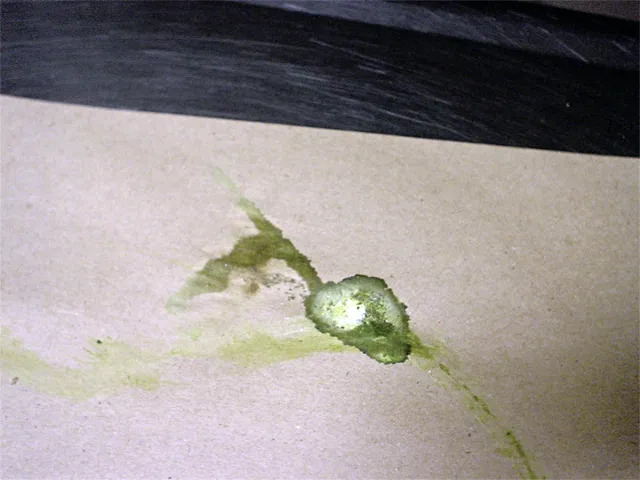
Cancers Of Various Types
Cancers of various types can lead to secondary symptoms such as diarrhea.
For example, intestinal cancer can directly affect the absorption and secretion process of the intestines, leading to diarrhea.
Other forms of cancer can indirectly lead to diarrhea by causing general ill health and metabolic disruption.
Egg Peritonitis
Egg peritonitis is an inflammation of the peritoneum (the lining of the abdomen) due to egg material.
This condition is often seen in egg-laying budgies and can cause a range of symptoms, including diarrhea, due to the inflammation and infection.
Cystic Ovary
A cystic ovary can cause diarrhea in budgies.
This condition, which involves the development of fluid-filled cysts in the ovaries, can lead to hormonal imbalances that may disrupt normal digestion and lead to diarrhea.
Bile Duct Cancer
Bile duct cancer, also known as cholangiocarcinoma, is a rare type of cancer that can cause diarrhea in budgies.
This cancer affects the ducts that carry bile from the liver to the small intestine.
If these ducts are blocked or damaged, it can disrupt the digestion process and cause symptoms including diarrhea.
What Are The Symptoms Of Diarrhea In Budgies?
When a budgie has diarrhea, the signs and symptoms can vary depending on the severity and cause of the condition.
However, there are some common symptoms to watch for, including changes in their droppings and general behavior.
Loose, Watery, Or Excessively Runny Droppings
One of the most common symptoms of diarrhea in budgies is loose, watery, or excessively runny droppings.
This is the result of an increase in water content and a decrease in solid matter in the droppings due to the rapid transit of food through the digestive tract.
Increased Frequency Of Droppings
Another common sign of diarrhea in budgies is an increased frequency of droppings.
The bird may eliminate more often than usual, which can result in a noticeable increase in the amount of waste in the cage.
Changes In Color Or Consistency
Diarrhea can cause noticeable changes in the color or consistency of a budgie’s droppings.
You may see that the droppings have become lighter or darker in color, or they may appear unusually loose or watery.
Soiled Feathers Around The Vent
The presence of diarrhea can result in soiled feathers around the vent (the opening where a bird eliminates waste).
This can be an indication that the bird’s droppings are unusually watery or that the bird is eliminating more frequently than normal.
Lethargy Or Decreased Activity
Budgies suffering from diarrhea often show signs of lethargy or decreased activity.
They may seem less energetic than usual, spend more time resting or sleeping, and show less interest in their usual activities.
Loss Of Appetite
A budgie with diarrhea may experience a loss of appetite.
The bird might eat less than usual, or it might stop eating altogether.
This can lead to weight loss if not addressed promptly.
Weight Loss
Weight loss is a common symptom in budgies with chronic diarrhea.
Due to the loss of nutrients and the potential decrease in food intake, budgies may lose weight rapidly.
If you notice your bird getting noticeably thinner or lighter, it may be a sign of a serious health issue like diarrhea.
How To Treat Diarrhea In Budgies?
The treatment for diarrhea in budgies will depend largely on the underlying cause of the condition.
Here are some general strategies for dealing with this issue:
Veterinary Consultation
If your budgie is exhibiting signs of diarrhea, the first and most crucial step is to seek a veterinary consultation.
A trained avian vet will be able to perform a physical examination and possibly additional tests to determine the root cause of the diarrhea.
Based on these findings, they can provide appropriate treatment options.
Isolate The Budgie
If you have multiple birds, it’s important to isolate the budgie showing symptoms of diarrhea.
Diarrhea can be caused by infectious diseases that can easily spread among birds.
By isolating the affected budgie, you can prevent the spread of disease and also monitor the sick bird more closely.
Maintain Hydration
During a bout of diarrhea, budgies can lose a significant amount of fluids, leading to dehydration.
As such, it’s essential to maintain hydration.
This can be done by ensuring your budgie has continuous access to fresh, clean water.
In severe cases, your vet may recommend a special electrolyte solution.
Dietary Adjustments
In some cases, dietary adjustments may be recommended.
This could mean feeding your budgie a diet of easy-to-digest foods, or eliminating certain foods that could be causing the problem.
Always consult with your vet before making any major changes to your bird’s diet.
Medications And Treatments
Depending on the cause of the diarrhea, your vet may prescribe specific medications and treatments.
These could include antibiotics for bacterial infections, antiparasitic drugs for parasitic infections, or other medications to manage symptoms and address the underlying cause.
Maintain Cleanliness
To help prevent reinfection or exacerbation of the condition, it’s crucial to maintain cleanliness.
Regularly clean the cage, food and water dishes, and any toys or perches.
If the diarrhea is due to an infection, you may need to disinfect these items.
Follow-Up Appointments
Follow-up appointments with your vet will be necessary to monitor your budgie’s progress and adjust treatments as needed.
These check-ups are crucial for ensuring that the treatment is working and that your budgie is on the road to recovery.
What Can Be Done To Prevent Diarrhea In Budgies?
To prevent diarrhea and other health issues in budgies, a combination of proper care, diet, and management is needed.
The following are some preventive measures that can be implemented:
Clean And Hygienic Living Conditions
Maintaining clean and hygienic living conditions is one of the most effective ways to prevent illness, including diarrhea, in budgies.
This involves regularly cleaning the cage, replacing bedding, and disinfecting toys, perches, and food and water dishes.
Fresh And Clean Water
Budgies should always have access to fresh and clean water.
Stagnant or dirty water can harbor bacteria and parasites that can lead to digestive issues, including diarrhea.
Make sure to change the water daily and clean the water dish regularly to prevent contamination.
Balanced Diet
Providing a balanced diet is essential for the overall health of your budgie.
A diet that is too high in certain nutrients or lacks others can disrupt the digestive system, potentially leading to diarrhea.
A balanced budgie diet should include a mix of high-quality seed or pellet mix, fresh fruits, and vegetables.
Avoid Toxic Or Harmful Substances
Ensure your budgie does not have access to toxic or harmful substances.
This includes certain types of plants, human foods, and household products that may be harmful if ingested.
Keeping these substances out of reach can help prevent accidental ingestion and subsequent digestive issues.
Prevent Overcrowding And Stress
Stress can impact a budgie’s immune system, making them more susceptible to diseases that can cause diarrhea.
Overcrowding and stress can be prevented by providing adequate space and a calm environment, as well as separating birds that do not get along.
Regular Veterinary Check-Ups
Regular veterinary check-ups allow for early detection and treatment of potential health issues.
During these visits, your vet can check for signs of illness, discuss diet and care, and administer any necessary vaccinations.
Quarantine New Birds
If you bring new birds into your home, it’s crucial to quarantine new birds for a period to ensure they are not carrying any diseases that could be passed on to your existing budgies.
This period allows for any signs of illness to show up before the new bird is introduced to the rest of the flock.
Practice Good Hygiene
Practicing good hygiene can help prevent the spread of infectious diseases that can cause diarrhea.
This includes washing hands before and after handling your budgie, not sharing equipment between different birds, and cleaning and disinfecting cages and equipment regularly.
Faqs
Here are some frequently asked questions related to diarrhea in budgies:
Is It Normal For Budgies To Have Watery Poop?
Occasional watery poop in budgies can be normal, especially after consuming foods with high water content like fruits or vegetables.
What Food Gives Budgies Diarrhea?
Certain foods can cause diarrhea in budgies if fed in excess, not properly prepared, or are not typically part of their diet.
This can include overly ripe or spoiled fruits and vegetables, foods high in sugar or salt, dairy products, caffeine, and alcohol.
Always research before introducing a new food to your budgie’s diet, and when in doubt, consult with a veterinarian.
Why Is My Budgie Poop Green And Watery?
Green and watery poop in budgies can be caused by several factors.
If your budgie has been eating a lot of green foods, its droppings might naturally be green.
However, if the poop is also watery, it could indicate diarrhea.
Other causes could include bacterial or viral infections, dietary changes, or stress.
If the condition persists, it is recommended to seek veterinary advice.
How Will My Veterinarian Determine The Cause Of The Diarrhea In Budgies?
Your veterinarian will likely use a combination of methods to determine the cause of the diarrhea.
This can include a physical examination, review of your budgie’s dietary history, and environmental factors.
They may also conduct laboratory tests, such as fecal examination to check for parasites, bacterial cultures, and blood tests.
The diagnosis will guide the appropriate treatment plan.
How Can I Differentiate Between Normal Budgie Poop And Diarrhea?
Normal budgie poop is typically firm and round with a distinct white part (which is urates, equivalent to mammalian urine) and a green or brown part (the fecal matter).
On the other hand, diarrhea in budgies is characterized by loose or watery droppings.
This can also be accompanied by a change in the color of the droppings or an increased frequency of bowel movements.
Any changes in your budgie’s poop, such as these, could indicate a health problem and should be assessed by a veterinarian.
Can Changes In The Environment Lead To Diarrhea In Budgies?
Yes, changes in the environment can indeed lead to diarrhea in budgies.
Budgies can be sensitive to changes in their environment, such as changes in temperature, noise levels, or the presence of other pets or people.
Stress from these changes can negatively impact their digestive system, leading to diarrhea.
Therefore, it’s essential to ensure your budgie has a consistent, calm, and comfortable environment to live in.
What Are The Long-Term Effects Of Diarrhea In Budgies If Left Untreated?
If left untreated, diarrhea in budgies can lead to serious health complications, including dehydration, weight loss, and nutritional deficiencies.
Additionally, persistent diarrhea could be a sign of a more serious underlying condition, such as a bacterial, viral, or parasitic infection, which could worsen without treatment.
Therefore, it’s crucial to seek veterinary care if your budgie has diarrhea to identify and treat the underlying cause promptly.
Can Budgies Recover From Diarrhea On Their Own Without Any Treatment?
While minor, temporary bouts of diarrhea due to a minor dietary indiscretion may resolve on their own, any persistent diarrhea requires veterinary attention.
Persistent diarrhea can be a sign of more serious health issues such as infections or organ malfunctions.
Therefore, any case of diarrhea that lasts more than a day should warrant a trip to the vet to ensure the proper treatment is administered.
